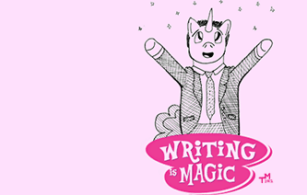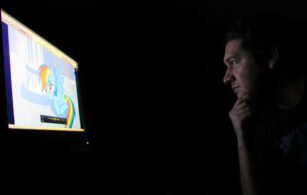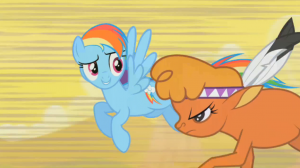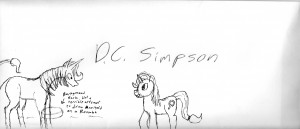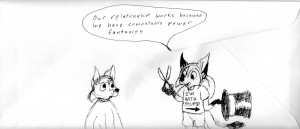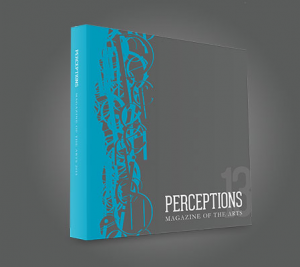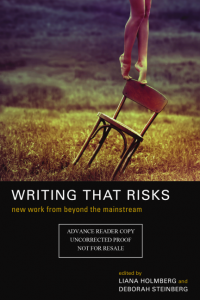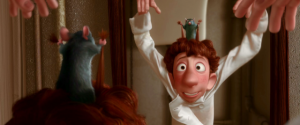Those who follow trends will always be behind them.
Author
Sharif is the Poetry Editor for the Southern California Review and a Masters of Professional Writing candidate at USC. He became aware of the reboot of My Little Pony while working on a fiction piece called “Unicorn Hunting” (still unfinished) in 2011. Because of this story, his roommate showed him the pony memes. He used...
Video from the LA Times Festival of Books!
If you recall I did a poetry reading at the LA Times Festival of Books. Finally, here is the video so that you can lie to your friends and say that you were there! Or if you’re just curious about the type of writing I do, well sorry, but this is mostly just poetry. But if you want to see the type of poetry I do then here’s the video!
The video is awesome. There are people laughing and groaning, and there’s a poem about a Roomba, and a humor piece about a heterosexual unicorn, and a sad thing about crows, and something about Laika (the first dog in space), and this thing based on this Noam Chomsky quote about green ideas dreaming furiously. OH YEAH THERE’S A POEM ABOUT MY LITTLE PONY!
Introduction by Caron Tate (0:00)
Humor List
Uncovering a Unicorn Mare’s Nightmare: Signs Your Son Is Only Attracted to the Opposite Sex (1:11)
Poetry
The Art of Being Expendable: An Instruction Guide (3:33)
Crow Parenting (5:11)
The Roomba Suicide (6:05)
Best Pony (8:00)
How to Treat Your Ideas (13:40)
Why Do You Even Want a Book?
Writing students seem to have a common obsession, getting a book with their name on it. I had a friend in undergrad who would always talk about how she just wanted a book. One book and she would be happy. She disregarded all criticism and fired all of her editors, because she felt they were getting in the way of her dream by telling her to slow down. Now she has the book, a novel. It’s available to buy now. I would link it, but it’s the worst book I have ever read, and I can say that without hyperbole. After the novel came out the head of the fiction department at her MFA said that this book might ruin her career as a writer. She was so driven by her goal of getting a book out that she ignored any reason why she wanted a book to begin with.
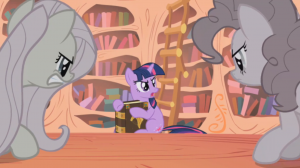
“This is my book, and people are going to read it…by the Christmas shopping season, regardless of how many more edits you think it needs!”
Asking someone why they want a book seems almost too obvious to answer, yet after they actually think about the question, they realize it’s actually much tougher than they thought. The answers I’ve mostly gotten were desires for attention, celebrity, money, etc. Of course, keep in mind nobody actually gives up these answers so easily or in so many words. Everyone’s like a contestant on “The Bachelorette,” even if they’re not playing “for the right reasons” they’ve all learned how to talk like they are. And no self-respecting writer readily thinks of themselves as a hack.
If anything I’m surprised how many people are willing to admit that they write as a means to get a book, and the book is the means to money, attention, fame, validation, whatever else they are looking for instead of the book. It’s a dangerous question: “Why do you want a book?” because it calls into question why you’re devoting your life to something. It’s a scary idea to think that you have no fucking clue, and believe me, many people don’t.
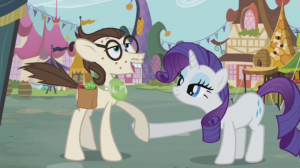
“I’m not on ‘The Bachelorette’ to find love. I’m mostly just publicizing my website. Getting physical with a hot white girl is just a bonus.”
And so you see students who will write anything to increase their publications. I’ve been lectured by a writer about how it’s about the quantity and speed of publications and not the quality of the writing. I had another writer go on for days about how Native American literature was the new trend in writing (apparently) and how she wished she was Native American so she could get the book deal (This isn’t just a willingness to compromise self-expression, but the entirety one’s self!) I heard about a student, without any fight, agree to his thesis adviser’s recommendation that he write genre fiction. That student admitted a hatred for genre fiction and a want to do a literary novel, but the adviser had a connection to a publisher. So he agreed so he could get the book. When he told me this story, he wanted me to pity him for having such a terrible thesis adviser, but I was just filled with contempt. If his own vision wasn’t something he could stand up for, then why should I care when it’s taken away?
I know the writing field is not as much of a meritocracy as it should be. I think all arts are corrupt in that way and probably always have been. So I won’t say that these people are going to fail, but what I am saying is that I don’t think these people will be proud of themselves in the end. There’s a difference between an artist and a content creator. The difference is that an artist owns their vision and manifests it, while a content creator manufactures a product. Maybe it’s just me projecting myself onto others, but I couldn’t be happy as a content creator.
I’ve never made a compromise with my editors or instructors that I didn’t agree with, that I didn’t feel still captured myself, my vision, my writing. I think the rarest and best answer is, “I want a book, because I write.” I want to share my stories with other people. The book is a venue for that. That’s why I want to be published, to serve my ideas. I see a book as a service for my stories; I don’t see my stories as a means to a book.
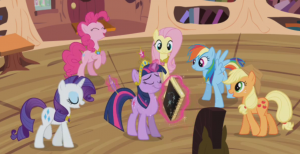
When I publish a book I want to be proud of what I wrote, not that I caught the market at the right time. I’m a writer, not a god damned real estate agent.
Then again, I’ve been spit on and dismissed as a writer, a theorist, and an editor so many times during my career as a student that I’ve developed a pretty mean chip on my shoulder. I know if you dissected me enough you would find vanity and validation motivating why I want a book, underneath the desire of serving my ideas. Maybe I’m also a Bachelorette contestant, here for the wrong reasons, but I’ve learned to talk the talk so well that I’ve tricked myself into believing my own fairy tales.
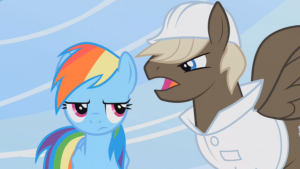
“I’ve never seen writing like yours before. Now if that sounded like a compliment, let me disambiguate, there’s no market for you. Who you are is someone nobody is interested in. Become someone else or you will fail.”
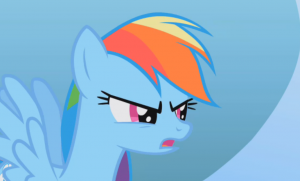
“I’d rather try and fail as myself than ‘be smart’ and succeed as someone else. An attempt, I owe that little to myself and my dreams. What will your definition of success bring me when I’m old and wondering what it is I’ve done with my life? Am I going to wonder what would have happened if I only had more courage when I was younger? Besides, I’m a damn good writer. I dominate the audience at readings and have little trouble getting published. I’m working out just fine as a humor writer, so thank you for your concern.”
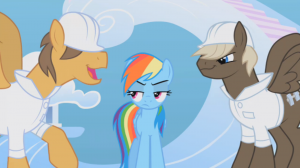
“You? A humor writer? That’s funny, because your writing makes me laugh…wait. I mean your writing is a joke. There, much better. Good self-edit.”
Who knows? I never put much thought into this question until I started my master’s program, which has a (sub)culture of among the students of being more interested in learning how to be a successful writer than in learning how to write (as if the two have nothing to do with each other). Considering my program is called a Masters of Professional Writing instead of a Masters of Fine Arts, this really should have been no surprise. I just wish someone would have told me earlier. I’m kind of lonely here, and I’m becoming angrier the longer I stay here. I’m having a harder time not just shouting “If you don’t have any fucking passion for writing, maybe you shouldn’t be getting a masters degree in it! Clear the bookshelves for people who care! Your life is too short to do something you don’t love! Maybe writing isn’t what your cutie mark is telling you.”
Note: I don’t know if this is a majority of people in my program or just a vocal minority, but it’s draining me just the same, and I want it to change.
Now, I’m not saying to give up if you’re not very good or not very successful. We all start off with varying degrees of bad writing. We have to work our way up. Writing well is something you can learn with focused study, right reason, time, and practice. I would never tell someone to give up on something they’re passionate about (#ratatouille). What I’m saying is if you don’t have passion for what you do, regardless of what you’re doing, you owe it to yourself as a mortal creature to be honest with yourself about it and not waste your life on it.
Maybe I’m the not the unheeded prophet, maybe I’m just wrong, naive, & idealistic. But I spent several weeks showing people how to SELL their creative works on Kickstarter. It’s not like my head is completely in the clouds and not grounded by captialism reality…right?
Investing Time: When It Backfires
So my best friend growing up, Mike, made this observation about me: “You work really hard so that you don’t have to work harder later.” He told me this when I said that my summer should be easy because of how far ahead I was on my thesis. So the class to begin preparing someone’s thesis would be easy.
My thesis prep class is a one on one class with a faculty instructor. By then end of the summer you need 60 pages of ready to print work. I gave her about 90 pages on the first day.
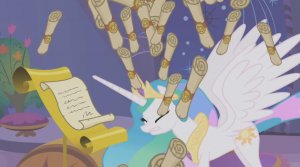
“Here’s the thesis I’ve been working on since undergrad. I’m going to go off to enjoy my summer now. BYE!”
As you might have expected, this did not go as planned.
Meeting 1
She pretty much said that master’s thesis is supposed to be representative of the work I’ve done at during my master’s degree. She didn’t feel the poetry worked well with the fiction and so the poetry was kicked out. Also she didn’t kick out my fiction, but she just didn’t really talk about my other stories. She just said “Unicorn Hunting” is ready for print.
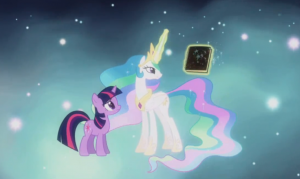
“What do you mean I have to write another 35 pages? I just need 60 pages. Didn’t I give you 75 pages of awesome stories?”
“No, you gave me 25 pages of AN awesome story and 50 pages of failure.”
Finally she said that it would be in my best interest if we worked on a short story from scratch together so I could have one more solid, finished piece in my arsenal. We decided we would work on new work for meetings 2 & 3 while using meetings 4 & 5 to edit.
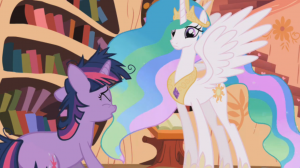
“My friends have thesis advisers that are lazy, don’t show up, and/or let them get away with terrible writing. Why did I have to get a thesis adviser who cares about my development, supports my aesthetic, and worst of all has integrity?! You’re getting in the way of summer. I have a Universal Studios pass that’s about to expire, and I paid way more to get parking on the pass, and I didn’t use it enough to actually get a return on that investment!”
“I’m sorry, I guess I just wanted you to get the most out of our meetings. Hey, wait! You’re the one who ask ME to be your thesis adviser! You’re not the only one who has a summer, jerk!”
Meetings 2 & 3
The story I decided to write was ambitious and beyond my current skill as a writer. I had to develop more in order to do it justice. My adviser really guided me on exactly how to do it. I really can’t imagine the story coming out as well as it did without her help. Although, because the idea pushed me so far beyond what I was used to, not surprisingly my submissions were almost always tardy and short on pages.
I was supposed to give her a short story for meeting 2 and a new short story for meeting 3. I gave her half of a short story for meeting 2 and the second half for meeting 3. On top of that those pages were several hours late. She didn’t seem to mind, but I felt like if I were a better writer I could have managed the deadlines. So it just felt overwhelmingly like a personal failure, even though what I was doing was actually a personal best.
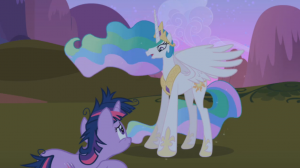
“You have submitted your pages 12-24 hours past your deadline. Your tardiness has made it impossible for me to print your manuscript before my flight. You will NOT receive gentle, personal, pencil notes on a physical manuscript which would be bound together with a doggie-shaped paperclip. Instead you shall receive a cold, sterile Microsoft Word document marked up with the comments feature. The only personal touch you will feel is my attempt to lessen the blows of your failures with smiley face emoticons.”
“That’s actually better. It’s easier for me to lose a manuscript bound together with a doggie-paperclip than it is to lose my laptop.”
“Oh, well, should we just do this from now on then?”
“I mean, whatever is easier for you.”
“Well, the university gives me free printing services, so if you want a physical copy…”
“Actually I have access to free printing services too, so–“
“Yeah, I’ll just send this to you, and you can decide to make it tangible or not.”
“I’ll probably keep it digital, because when I edit I can do a dual monitor setup with my TV and my laptop. It’s kinda neat actually.”
“We’ll do this from now on then. But get your work done on time!”
Between Meetings 3 & 4
In between this time I wrote The Art of the Dress: Lesson on Criticism
After the a lot of trying to think smarter rather than work harder, I still ended up working a lot to fix up the story. She replied with an e-mail saying that she wanted to talk about the story, which I mentioned at the end of my last post.
I had no idea what I could possibly do. I was getting some slight anxiety over it.
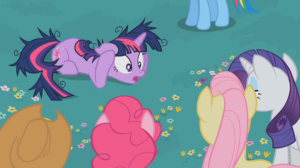
“I don’t know what to do anymore. Any of you girls have a gun I can borrow and a bullet I can have? No, I will not call the suicide helpline.”
Meeting 4
I must have had at least some sound logic in the Art of the Dress post. It turned out she liked it. I must have been reading into things from a place of insecurity, because she said she could sign off on it after a few slight revisions. Finally, all that hard work paid off and we were done! Ahead of time!
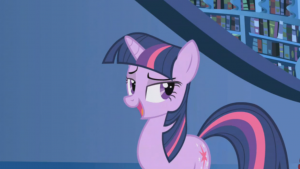
“Well, if we have 60 approved pages and ahead of schedule, then I guess I’ll just head over to Universal Studios…”
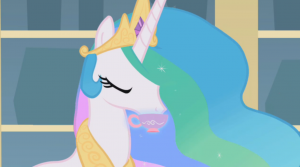
“I want you to write me another short story for our last meeting. It would be a shame to break your current momentum.”
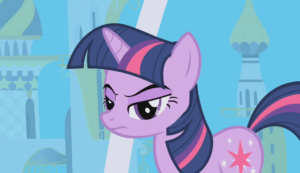
“It would also be a shame if I let my Universal Studios pass go to waste, but I guess a writer is someone who writes, not someone who goes on the new Tranformer’s ride…”
Note: My thesis adviser is the nicest person and would never say the things I wrote in here for humor. USC mostly has a fantastic faculty of caring individuals, but you do hear the occasional horror story. I know this was told in the style of complaining, mostly for comedic effect. However, since my adviser didn’t let me be lazy, I’m that much further along in my work. And perhaps next year when I finish my final project, I’ll get to skate by on the work I did this summer, though I doubt it. I guess the real lesson I’ve learned is that I’m not the type of person who should get annual passes to theme parks.
Over Burdened: Comic-Con, Southern California Review, and School
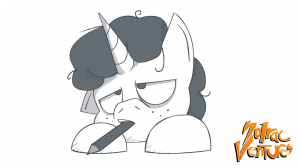
My OC Iambic Hexameter is exhausted with all the writing he has to do lately. Drawing by Kreid from Solrac Ventures
I have been more productive in the past few weeks than I have been in the last few months combined. That would be a good thing if it wasn’t so exhausting. Also, I’m kinda an agnostic Muslim, but I still play Ramadan. So all this work and thinking and stuffs has been while not eating or drinking while the sun is up. I’ve had to cheat on some days.
I fasted throughout Comic-Con so that I could get some extra Allah blessings as I ran up and down the San Diego Convention Center trying to get copies of the Southern California Review to select cartoonists that I respect. Since the other editor-in-chief and I have made the decision to start adding literary art comics as one of the genres that we publish.
I’m still waiting to hear back from most of the comic artists, whom I’ve been e-mailing individually, whom I’m also giving a month until I consider myself blown off and try for others.
So far we’ve confirmed Dana Claire Simpson, the artist behind the finished web comic Ozy and Millie and currently her syndicated comic strip Heavenly Nostrils which you can read for free on gocomics.com.
We have a tentative not completely a yes, but more like a probably from Nate Powell, graphic novelist who made Swallow Me Whole, Any Empire, and just released the first volume of a graphic biography about Civil Rights icon Congressman John Lewis called March.
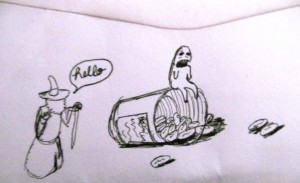
Swallow Me Whole Fan Art. I won’t show the reverse side because my Any Empire artwork came out terrible…
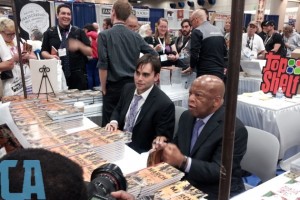
Comic Alliance actually took a picture of me talking to Nate Powell about the Southern California Review. (Top Left: Me, Top Middle: Nate Powell, Middle: Andrew Aydin, bottom right Congressman John Lewis
I wanted to have time to personally draw fan art and make a personal letter to each cartoonist explaining why I was a fan, why we were interested in their work, and why their involvement in Southern California Review would be important. I hated soliciting work as poetry editor, because I couldn’t really do things like this to show how sincerely I liked the poets work. I don’t like mass letters. I like a personal touch, but it takes a lot of time. I drew these envelopes while in a laundry mat the day before I left for Comic-Con.
Last weekend I took a television writing class taught by a writer on the Simpsons, Michael Price. Which was both fun and time consuming. It really taught me a lot about working in a writer’s room and really got me over my fear of them. This is something I’ll probably write about when I have more time. Doing this class right after doing a killer revision of a short story was creatively draining. I mean I literally finished the draft at 8AM after an all-nighter, took a shower, and drove to USC to attend this all day class which got out at 4.
But right now I still have a 6 page homework assignment to turn into that class, and I have a ton of reading to do for my thesis adviser, who I don’t think is too happy with my last revision of my short story. Her e-mail had a “We need to talk” vibe to it.
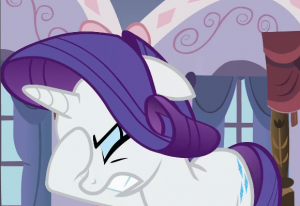
This is a real facehoof if you read my previous post.
The Art of the Dress: Lesson on Criticism
As I write this I am recovering from Comic-Con and battling against a deadline where a short story wrote needs to be second final drafted. After meetings with my adviser she had told me a lot of her comments verbally, and we were largely on the same page. I was shocked to see that on the written pages there were way more notes, and it was worse than I had thought.
Before we get started, any bronies and non-bronies might want to (re)watch the first part of the song to get the context of this post.
I had a little too much fun writing this story. I added a lot of avant-garde elements that were definitely too experimental. Some of the tools were things like excessive footnoting, the pretense of the story being historical fiction from the future about our times, animal dialects, pop culture references, sci-fi fantasy sequences, and treating animal languages as being tools manufactured by their perception of the world (my take on the Whorfian Hypothesis).
It was fantastic for a writer like me who loves the social sciences to create the politics and social dynamics of this world. And just in terms of technique, and what I needed to earn was one of the most ambitious pieces I had ever attempted. The first draft was far from perfect, but considering how many ingredients for failure I threw into the mix, I dared this story to fuck up. Yet with theory I knew how to make it all work, or so I thought, or so I’m thinking.
Regardless of how this turned out, I had an incredible time writing it: minding the intimate details. It was like I was twirling around my room, carefully cutting all the pieces of the story and watching them magically twirl about until they formed something whole and beautiful.*
Then the song kicks up again, and we enter the nightmare stage.
There’s a lot of “This doesn’t work for me,” and “I’m not buying this element,” and “I think we should remove this.”
For the most part an editor’s job is to provide you with solutions and usually the easiest solution to make the piece work. My problem was that most of my experimentation doesn’t exist in your everyday story. So the easiest fix when it doesn’t work is “Remove it.”
My editor an I are both on a firm deadline from my writing program to have this revised and signed off by the end of the week. The story is a strong enough story to exist without the avant-garde bullshit. However, the story doesn’t feel right without it. So I was posed with a moral question. Do I just send in an obedience draft where I mindlessly do exactly what my editor wants just to meet this deadline and then change it back to what I want before I publish it? As Rarity puts it, “There’s simply not much time.”
But I thought about something a friend sent me about a month ago. She said that her screenplay pitch had gotten all these weird criticisms about changing the main character and other such things to the point where they were asking her to write a completely different movie. I took a look at her treatment and pitch and saw where the real problems were. It wasn’t that her story was the wrong story to tell, or that she had picked the wrong protagonist, but that her pacing was off. The central conflict was in the first act instead of the second act, which made it seem more like a different character should have been the protagonist. I told her:
…[O]ne thing I’ve learned is that the surest way to ruin something is to take criticism at face value.
This is Rarity’s mistake. She does exactly what her friends tell her to do. They end up ruining the dresses. Remember an editor’s job is to find what doesn’t work and find A SOLUTION. It is your job as a writer to see if this solution is practical. Also to see if the editor is actually solving the real problem.
Being able to take criticism is a skill that requires a lot of practice and patience. Some people act like being able to take criticism is just not crying when facing a lion’s den of a workshop. It’s not just being able to handle advice with grace and poise regardless of how tactless or rude it might be. It is about being able to improve your work and yourself despite the message or the messenger.
One thing that appears a lot in my notes is the phrase “When/Why does this happen?” Even though there are entire sections that actually address the whys and the whens in a pretty heavy-handed and obvious manner. My first reaction to comments like these were rage. My editor wasn’t reading closely enough. They weren’t paying attention! I did my due diligence here, but they ignored it and commented on me as if it was a fault in MY WRITING!
But then I thought, maybe that part was just boring? That’s why they missed it. That’s the real criticism. Instead of calling attention to details again, I just need to make the ones I put in more interesting so they will stay with the reader. Perhaps by improving the prose or with better imagery, etc.
So for the avant-garde elements of this story, I need to do the same thing. I can’t make Rarity’s mistake. This is my story. When people read it they will be seeing it as a test of what I can do as a writer. I don’t want to have my name on something I don’t believe in.
Remember, it’s about “balanc[ing] style with adherence.”
Read MorePoetry Publications (Brief Bragging)
People say that there’s no money in poetry. That’s reasonably true. Last year I’ve made about $75 publishing poetry. I’ve gotten 3 poems published in 2 places. I submitted to 20 places, giving me a 10% acceptance rate. I don’t mean to brag, but these are EXCEPTIONAL numbers. Yet, I wouldn’t be able to buy the new Animal Crossing and guide book with it.
The first publication took two of my pieces and is available now…I-I really don’t know how you get one though. There’s no place to buy it on their new website. Anyway, my poem “Fanajeen” won their poetry award and is on their website. They also published my poem “The Roomba Suicide.” Since you can’t buy it, and its been awhile, I don’t see anything wrong with doing this.
The first one will be released this fall in a print anthology by Red Bridge Press called Writing the Risks: Volume 1. It is a fledgling anthology from a fledgling press which celebrate writing that pushed the limits of the established paradigms of the writing business.
Read MorePremise Bias
A few years back I was in a bar with a couple of friends. M had just gone off to grad school and was giving us reports about the people in her program and their work. G was her bestest best friend at the time and had already heard all of the shit-talk. I was sipping a particularly well mixed snake-bite (half stout half hard cider); I put it down quickly and said, “Yeah, so what was so terrible [about their work]?”
M said, “Oh, my God, Sharif! It’s just so baaaad! I was wondering how they got into this program, you know?” G started giggling, already aware of the dirt. “One guy, wrote a poem about werewolves having sex.” G couldn’t restrain herself and burst out laughing.
I smiled, “So why was it bad?”
M restrained a yell, “It was about werewolves having sex!”
“And was it not done well?” I asked. G began to stop laughing.
M insisted, “It was about werewolves having sex!” M noticed that I wasn’t really amused, in fact I was judging her for closed-mindedness.
“Okay, well, hear this one! Someone wrote a poem about vampires!” She said a few more things and shot down her classmates, offering little more explanation than premises. As someone who writes high concept work like a stork who kidnaps babies (“Stork” in Writing That Risks to be released by Red Bridge Press Fall 2013) or a Roomba that kills itself (“Roomba Suicide” Perceptions Magazine of the Arts. Print only. 2013.) I had a feeling that they were indirectly trying to take digs at me.
I asked, “So what subjects can art be about and what subjects are not art?”
Where as M and I were writing students, G was an art/writing double major. While writing classes do not actually address the questions of “What is art?” art classes definitely do. G stopped laughing.
M was trying to regain her status and justify her remarks, “No, you just don’t do poems like that.” This was just like her, to say an opinion like it is fact and expect you to take it on her authority.
“What about a poem about a video game?” I asked. Sensing that this was a trap, she didn’t spring it. I sprung it on her anyway, “What if that video game was Sega Ghost Squad?” She knew I was referring to the poem by Colette Atkinson, our former professor at our university. “Ideas aren’t writing. Anyone can have ideas. It’s how you write them that determines if they’re good. Colette Atkinson used Ghost Squad very well to tell the story of a shitty relationship…Just because it’s not ‘high art’ doesn’t mean it’s bad.”
I’m not sure whether they were trolling me or not, but the discussion ended there.
I was reminded of this anecdote when I was talking on the phone with a writer in my program and friend Jonathan Rosenthal (Pound Puppies, Recess, Hey Arnold!). We were talking about the premise for Pixar’s “Ratatouille,” which is a great film. Jonathan said, “No premise is bad so long as it has a good answer to the question ‘And then what happens?'”
Seriously, that is such a FANTASTIC writing perspective that I’m going to quote it again:
“No premise is bad so long as it has a good answer to the question ‘And then what happens?'” -Jonathan Rosenthal
Looking at the premise for My Little Pony: Equestria Girls, it is a pretty awful premise.
Princess Twilight Sparkle must leave her land of magical talking ponies and become a human in the human world where she must become prom queen to win back her stolen crown.
It was so awful that people started throwing fits about it, and death threats were given to DHX (the studio that animates MLP). Before this similar hostility was given to MA Larson for writing the episode where Twilight Sparkle becomes a princess/god/alicorn. Yet after seeing the actual execution of these premises, people remembered that Megan McCarthy and MA Larson are actually pretty bad ass writers who can handle their shit.
A premise itself, is not enough to judge a work. If you are this closed minded you can keep yourself from writing the next great novel, or publishing it, or making it into that movie. Keep in mind that bronies should have never liked My Little Pony. They discovered that despite the genre, the premise, and the demographics, the execution of the show made it something more than just engaging, but heartfelt and powerful.
I really liked Spenser’s (Brony Clubhouse) video expressing his disappointment with the over reacting part of the brony fandom who should know better than to judge a work by the basic idea alone.
So let’s play a game. I’m going to put a list of premises/ideas of existing properties. Your studio has developed a reputation for producing terrible films. They hired you to try to turn the studio’s reputation around. You are authorized to make 5 properties, whether it’s a TV show or a movie, or whatever. You will not be working on the films, your job is just to green light the films you think will be the best. You must reject 5 ideas and go with the best 5 based upon their premise. Honor system. No cheating if you recognize the title. Remember, your studio is not concerned with money, but quality.
- Sex-changing martial artist finds himself having to deal with the challenge of having too many fiances while constantly having to engage his enemies on various forms of combat from martial arts Japanese tea-ceremony to ice skating martial arts fighting.
- A teenager takes a time traveling car back in time accidentally undoing the circumstances of his own birth.
- A teenage girl finds herself obsessively and dangerously in love with a monster hiding as a human, which is perfectly evolved to be irresistible.
- A bunch of high school kids from different cliques attend Saturday school together and learn they aren’t so different.
- A rat who wants to be a chef tries to achieve his dream by controlling a human who is hopeless at cooking by pulling his hair.
- Unlikely paranormal investigators must save the world from the upcoming apocalypse to be brought about by The Great Destroyer, who takes the form of a giant commercial marshmallow man.
- A bookworm studying magic is forced to study the magic of friendship in order to prevent the world from being cast in eternal darkness.
- The last members of a dying planet shoot their baby to a distant planet whose sun gives him super strength, speed, vision, and flight.
- After a failed attempt to drown himself in a river, a man finds himself stranded on an island in the middle of the city, where he uses trash to adapt to his new life.
- Things go wrong in a theme park full of dinosaurs causing a life and death situation for the people there.
BONUS: Teenage Mutant Ninja Turtles
Ranma 1/2: If you thought of making something with this premise and decided against actually doing it, then you’re not Rumiko Takahashi, at a point Japan’s wealthiest woman, who made a fortune off of Ranma 1/2 and Inuyasha. Both of these series are not just widely popular but are considered classics and a must watch for any anime enthusiast.
Back to the Future: The way I wrote that premise, I would not have made this movie and I love time travel…and cars. But the premise just sounded bad or at least like it could go bad at any moment.
Twilight: I have to say I would have put my money on making this. The premise sounds fantastic! But are these good movies/book? I’m of the popular opinion that they aren’t (even though I’ve only read a chapter or two of the books). That’s the reason I included it. To show that even a good premise with poor execution will make a bad movie. Really what we’re learning here is that a writer’s ability isn’t in his ideas, but how he brings them to life.
The Breakfast Club: This movie does not have a premise that would make me risk investing my money, but it’s a classic. It resonates with a lot of people…people who still live with their parents.
Ratatouille: This is the film that inspired this blog post. At least it inspired the conversation that inspired this blog post. After the movie was made someone at Pixar was lamenting how stupid the premise was, even though the film ended up being fantastic.
Ghostbusters: Proving that with humor you can really get away with a lot. One of the better TA instructors at UCI taught me that with humor, camp, self awareness, and lampshades you can make a really enjoyable work which gets away with anything. Ghostbusters not only gets away with murder with the Stay Puft Man, but they created one of the most recognizable scenes in cinema.
My Little Pony: Friendship Is Magic: Well, without someone buying into this premise, none of us would be here. I’d probably have a much more cynical blog where I’m just like every other jerk writer trying to establish some sort of platform for himself. I’d probably be trying to exploit my race or something. Anyway, without someone giving the magic of friendship a chance, we wouldn’t have followed Twilight Sparkle and friends. We wouldn’t have discovered that a world of ponies could be so rich with humanity.
Superman: Coming from one of the dumbest origin stories ever, Superman has become the icon of modern day mythos and American society. So goes America, so goes Superman. “Man of Steel,” possibly being the first film to crash airplanes in building since 2001, is really a film about the divided identity of America post 9-11. Speaking of “Man of Steel” I would argue that this film shows how a movie can be simultaneously excellent and terrible based on execution alone and not the premise.
Casaway on the Moon: This is a South Korean film, so of course they’re obsessed with the effects of capitalism and technology on the human individual. This film explores the human pain and loneliness while being surrounded by people. This is profound, powerful, creative, fun, moving, and on Netflix. It would be a shame if someone passed on this because of the premise.
Jurassic Park: Of course this film made a gagillion dollars. As a kid this was the only film I saw which traumatized me and made me afraid of getting eating by a T-Rex each time I went to the bathroom. If that doesn’t make a great film I don’t know what does…other than great characters, plot, tragic elements…
Bonus: Teenage Mutant Ninja Turtles: Enough said.
It’s natural for us to create patterns of what will be good and what won’t be. It’s to save us time and let us know that a movie about a hot tub time machine is a terrible idea. But keep in mind that good artists are not trying to just remake what has been done, but to break expectations and destroy the established paradigms. My Little Pony was done poorly a few times in the past. This My Little Pony is so great, because Lauren Faust broke paradigm after paradigm of what we expect from television for little girls. Unfortunately, premise bias is strong in the writing community and risk taking isn’t.
Read More
